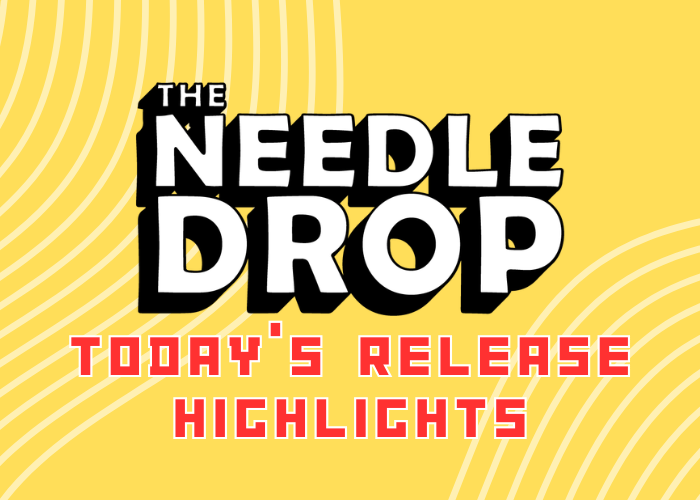Hey, everyone. Dopethany Rhymestano here, the internet's busiest music nerd. It's time for a review of this Lupe Fiasco album, Samurai.
Here we have a brand new LP from rapper, lyricist, and songwriter extraordinaire, Lupe Fiasco. Truly a veteran of the hip hop game at this point. He's really a dying breed rap artist who reminds you of the level of pen game you used to hear on a regular basis during the genre's golden age.
If you remember the last we heard from Lupe, it was a couple of years ago with his record Drill Music in Zion, which was a witty and conceptual commentary on rap music, the art and culture that surrounds it, and also the ways in which violence can sometimes be intertwined with it, obviously, in a negative and destructive capacity, specifically when it comes to his home city Chicago. And on this new project over here, of course, we are getting pretty meta once again, with a lot of the songs on this record, focusing on hip hop, on the art of rapping, on the creativity surrounding the craft. But in order to go down this road, Lupe is using a really interesting reference point as a source of inspiration.
Apparently, this 2015 documentary about Amy Winehouse that features a quote of her talking about lyrics that she had been writing at the time that she described to be battle rap style, saying she's essentially becoming a lyrical Samurai as a result of this. And again, using this as a point of inspiration, Lupe Fiasco essentially writes the quote/unquote story of Amy Winehouse becoming a rapper's rapper in a way, with parallels to the battle side of craft.
From what I've also read about this record, it was also originally intended to just be a single song with one of Lupe's long-time producer associates Soundtrakk. Then it just extended into this multi cut experience that spans 30 minutes in length, which lengthwise by no means is anywhere near Lupe's more grandiose and ambitious album statements over the years. But it's still enough material to explore this loose idea from multiple angles, enough so that you get a pretty clear idea of what the central themes and feelings and motivators behind this record are.
I will also try to give a heads up here and say, if you're going into this record expecting some super clear, linear hero's tale of Amy Winehouse becoming the greatest battle rapper of all time, you be sorely disappointed because, again, it's not so much a point A to point B type tale. It's more Lupe taking a thing, an idea as a point of inspiration and then using that as a vehicle to explore feelings and ideas and emotions that for years he's most likely had on hip hop and his involvement in it and the process of being a creator in that field.
Take the opening title track, for example, which is just a great tone setter for the album. It has this smooth ultra melodic chorus, jazzy background, instrumentation and vivid imagery coming off the lyrics, which essentially paint a character portrait of this girl who is an artist trying to make her way. We get a more in-depth look at this person on the following track, "Mumblerap," which has this very eerie cartoonish beat, flows on top of that from Lupe that very much giving A Tribe Called Quest vibes. And across this song, Lupe is bringing us back to that food and liquor, that kick-push era where he is telling us about somebody who is focused on a thing they're passionate about, advancing at it, getting better at it as he is, again, painting a picture of this girl, of this woman who is upset messing over becoming a rapper, becoming a lyricist. Everything she's doing and experiencing is coming together in her head like rimes, with, again, some illusions to there being a battle rap context to all of this.
Meanwhile, the following song, "Cake," is a lot of the same, but there's more of a competitive spirit to this one, with Lupe making note of the person who he is rapping from the standpoint of having won things. But this one takes the 'cake,' which makes sense given just how great the rapping and the writing is on this track. The flows, the rhythmic patterns, the internal rimes are just nuts. There are numerous standout bars and gems and bits of wordplay throughout this song. One that stuck out to me was, "Well, did she do it or didn't she? / Who are you mentioning? / Lou will duel a dual identity / Dueling enemies, do it to 'em / Chewing through 'em without doing it dentally." Through all the highs and lows of his career at this point, it is very clear that Lupe is operating at a different level than just most rappers are point-blank period. The ones who came not just after him, but before him too.
Following this, I am not as crazy about the start-stop verses on "Palaces," but I do think this is a very poignant and interesting track on the sanctity of the creative process and maintaining your authenticity in the midst of that as your creations can sometimes become sullied and compromised by insecurities, by materialism, by human error. And toward the end of the track, Lupe thematically circles back around to essentially remind himself to rap and write and create from the heart. There's a great beat switch and flow switch on the back end of the track, too, that I think picks things up quite nicely.
"No. 1 Headband" is yet another devotion to rap anthem with some classy horns, some jazzy cords, and lots of witty and playful rimes that are super sharp despite clearly not taking themselves too seriously. Lupe really just nails that balance of just a deep thought, but simultaneously light-heartedness that was the the arc of a lot of the classic and amazing albums of that '90s jazz rap era.
Things on the record get a bit moodier and get a bit darker with the song "Bigfoot, which is very much a meditation on the fame, the crowd, or really the lack thereof, and how self-conscious and insecure an artist can get when they're not getting that outside validation, when they're not getting that big break they were hoping for, even though they feel they deserve it due to their talents, due to their efforts. The track is really about the kinds of fears that may plague the artist's mind, and the melancholic keys that are all over the song are just the perfect soundtrack for it.
The record gets even more somber on "Outside," which is yet another internal struggle on the album. Very much a commentary on rapping and creativity again. In a way, what makes for something that's good, something that's bad, what makes something popular. It's interesting because even as an artist who's arguably made really great records and has been doing what he does for years, even Lupe doesn't seem to have all the answers, or maybe even any of the answers. Between miscommunications described on the track, a weird attraction to whack bars, and this desire for superiority that ends up becoming almost like a downside at the end of the day. It feels like Lupe, through his own thoughts and experiences, but also the character that he's created here, because obviously whatever idea he has of Amy Winehouse doing or saying any of these things is just a version of her that he has made up in his head. I guess you could say if this song is trying to relay anything, it's that art and creativity is not something that you do in order to necessarily discover hard, concrete answers about things. Often, you will end up with more questions.
I feel like, in a way, "Til Eternity," the closing track on this record is a tragic, inconclusive finish, where Lupe begins to come to terms with that fact. As thematically, the song is very much about giving your life to a talent, a skill, a pursuit, pretty much in the same way that a Samurai would give up their life to do what they do. But again, despite all of this effort, despite all of this focus, Lupe seems to be at this point where he still has a lot of questions and a lot of worries and a lot of concerns. And the song kicks off with him, essentially he's saying this is all just a part of the game. It seems like, again, he's coming to terms and he's accepting that it's really about the process, and he's passionate about the process and happy to continue engaging with it, even if some of these big picture answers or payoff or whatever didn't come at this point or maybe never come, ever.
I know there was a lot of talk in the lead up to this record about the Amy Winehouse thing and that point of inspiration. I'm not discounting that or saying that this album isn't inspired by Amy Winehouse or anything like that. But when you dig past that idea and that concept and that surface level PR press release framing, what you really get is a guy who is really analyzing his own process and his own creative journey up until this point. Which, of course, given that the artist in question is somebody who is as talented and as successful and as important and as influential as Lupe Fiasco, it still makes the story compelling.
I mean, there were some points where I do wish that the storytelling and the narratives and the takeaways on these tracks were a bit clearer, a bit more laid out, a bit more point A, point B. On that end, I feel like the record could have been just a tad bit more ambitious. And as an overall piece, I can't really ignore the fact that this album, it is a little scant, even if it does pretty much work in everything you need and nothing you don't weigh at the end of the day. There are way more bops and flops on this thing, even if I was left wanting just a little bit more.
I came away from this album pretty much feeling a light 8 on it.
Fantano, Lupe Fiasco, Forever.




What do you think?
Show comments / Leave a comment